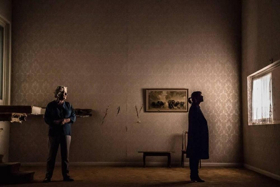Review Roundup: What Did Critics Think of THE CANE?

Alun Armstrong, Maggie Steed and Nicola Walker star in the world premiere of The Cane, written by Mark Ravenhill and directed by Royal Court Artistic Director Vicky Featherstone.
With design by Chloe Lamford and lighting design by Natasha Chivers.
The Cane will be performed in the Jerwood Theatre Downstairs Thursday 6 December 2018 - Saturday 26 January 2019. Press performances are 7pm Wednesday 12 December 2018 and 7.30pm Thursday 13 December 2018 with reviews embargoed until 11.59pm Thursday 13 December 2018.
"It will be the biggest send off any teacher has ever had. No teacher is as loved"
After 45 years as a dedicated teacher, Edward is looking forward to the imminent celebration to mark his retirement.
But his home is under siege. A mob of angry students have gathered. A brick has been thrown through the window, he and his wife haven't left the house for six days, and now his estranged daughter has arrived with her own questions.
"Why would they attack the most popular teacher in the school?"
Let's see what the critics had to say...
Charlie Wilks, BroadwayWorld: Friday evening's performance left a lot to be desired. After much anticipation pre-visit, the result was an incredibly disappointing one. And it then begs the question of what has been missed. Ravenhill's text is written in a way where the dialogue should bounce back and forth. However, the cues aren't picked up and the cast indulge a little too much, meaning it all gets a bit stagnant. The passive performances bring the stakes to an absolute standstill, which remove all sense of urgency.
Matt Wolf, The New York Times: "The Cane" anatomizes a world rife with and alive to violence at every turn and disturbs in a way that Mr. Ravenhill's more obviously confrontational early work didn't quite manage; this is a far more assured piece of writing. And arriving as it did at the end of a year notably lacking in good British plays, "The Cane" has set a commendably high standard for the year ahead.
Henry Hitchings, The Evening Standard: Though the play has a tantalisingly hallucinatory air, the symbolism is sometimes laboured - whether it's the 'very small' dimensions of Edward's cane, the anxiety about students rummaging in his junk-filled loft, or the loft descending as if the weight of the past is crushing him. But Ravenhill is careful not to make his sympathies clear. For instance, Anna can be interpreted as the voice of progress, yet has dark reasons for wanting to humiliate her father, and her own educational views are hardly enlightened.
Dominic Cavendish, The Telegraph: The Cane, which brings Ravenhill back to the Court for the first time in a decade, revisits the expired custom of caning in schools. But it also touches on broader questions about who makes the rules, and what the reckoning should be when tables get turned and those now perceived as transgressors are held to account. You could argue that the playwright, ever one to have his finger on this particular pulse, is here obliquely confronting the social media age of #MeToo.
Michael Billington, The Guardian: For the second time in a week on stage, a father's confrontation with an estranged daughter becomes a way of examining society. Mark Ravenhill's new play is less optimistic and more partisan than Mike Bartlett's Snowflake, but nonetheless has the same ability to show how private lives can intertwine with public issues.
Matt Trueman, Variety: "The Cane" lands with a thwack - a timely intervention in a topical debate. By dredging up the specter of corporal punishment in British schools, Mark Ravenhill's terse allegorical drama asks how we handle historic injustices. Can old complaints be forgot? Or should we seek redress, judging the past by present-day standards? The question's incisive; answers are elusive.
Paul Taylor, The Independent: Adroitly directed by Vicky Featherstone, The Cane strikes me as a clever, witty, slyly provocative three-hander that puts an intriguing and revealing perspective on the present. The play takes an antiquated, barbarous - then fully legal - practice and speculates over how today's children would respond to the idea that the older teachers once officiated over this prime ritual of control. The Crane also asks if it's fair to judge the past, with its different values, by the standards of the present.
Andrzej Lukowski, TimeOut: The play feels charged with meaning nonetheless. Its ominous suggestions are enhanced by Featherstone's fat-free, deadpan production and three terrific performances - particularly Walker, holding the show together with the snarling muscle and unsettling ambivalence of a prime Pinter antagonist. She really is a phenomenal actor, all sullen, muddied charisma and elongated east London syllables that carve the tense air like knives.
Photo credit: Johan Persson
Reader Reviews



